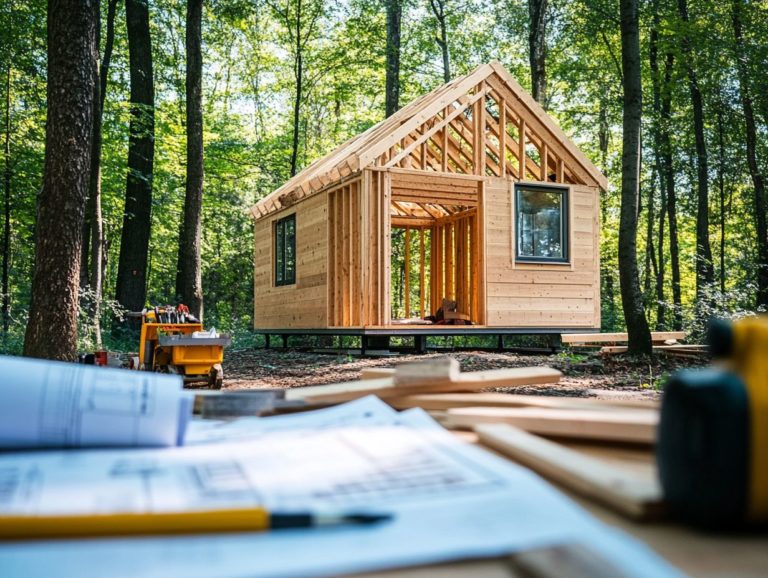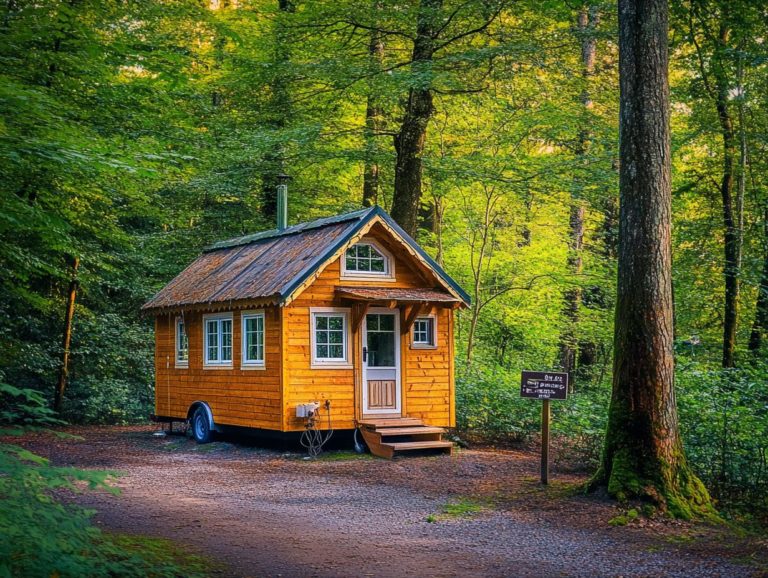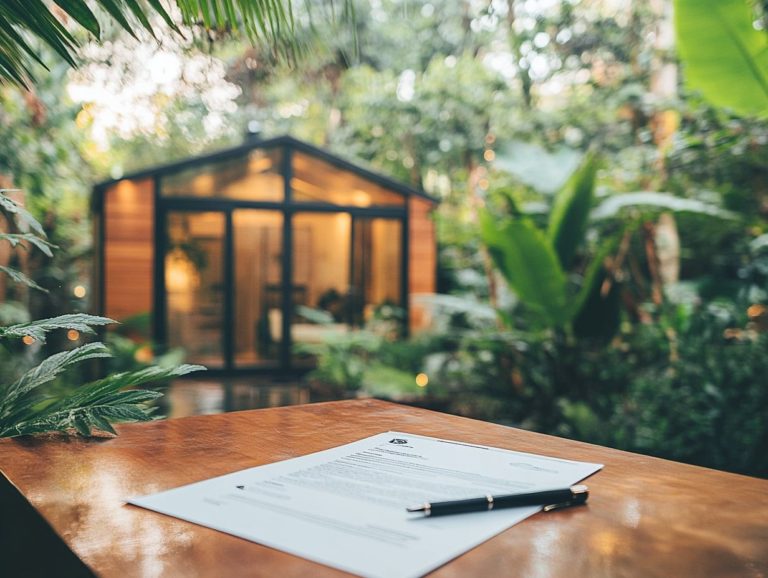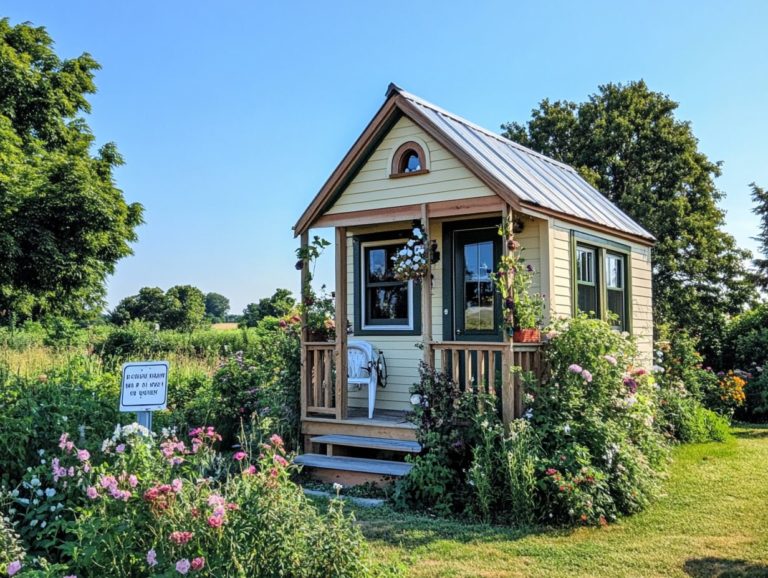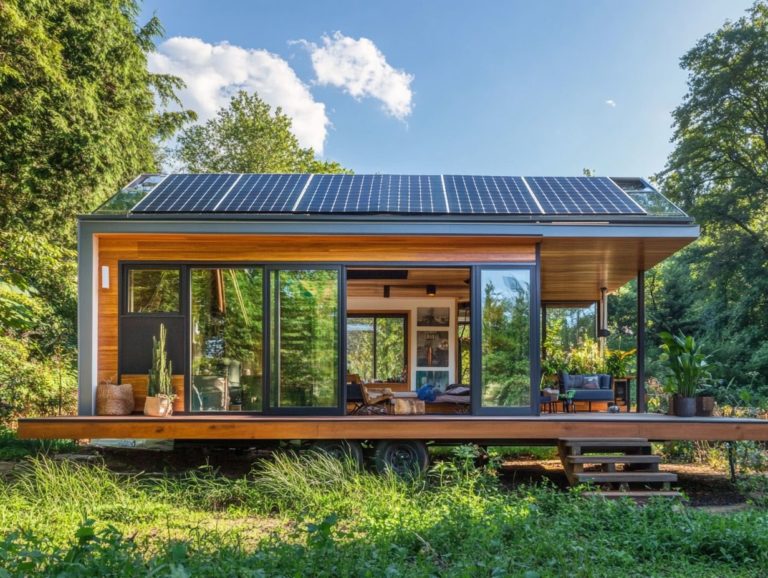Tiny House Land Ownership: Legal Considerations
Are you envisioning a simpler lifestyle in a tiny house? One of the most vital steps to turning that dream into reality is understanding the details of land ownership.
This guide will help you unlock the essential secrets of owning land for your dream tiny home! It addresses local zoning laws, building codes, and the various options available, whether that means buying, leasing, or joining a tiny house community.
You’ll also discover valuable tips for navigating legal complexities and working with local authorities. If you’re just beginning your journey or ready to make a decisive move, this resource will give you the essential knowledge for successful tiny house land ownership.
Contents [hide]
- Key Takeaways:
- Understanding Tiny House Land Ownership
- Legal Considerations for Owning Land for a Tiny House
- Options for Owning Land for a Tiny House
- Tips for Navigating Legal Issues with Tiny House Land Ownership
- Frequently Asked Questions
- What is considered legal when it comes to owning land for a tiny house?
- Can I legally place a tiny house on a piece of land I already own?
- What zoning laws should I be aware of when looking for land for a tiny house?
- Are there any building codes to follow when constructing a tiny house on land I own?
- Do I have to pay property taxes if I own land for a tiny house?
- Can I legally rent out my tiny house on land that I own?
Key Takeaways:
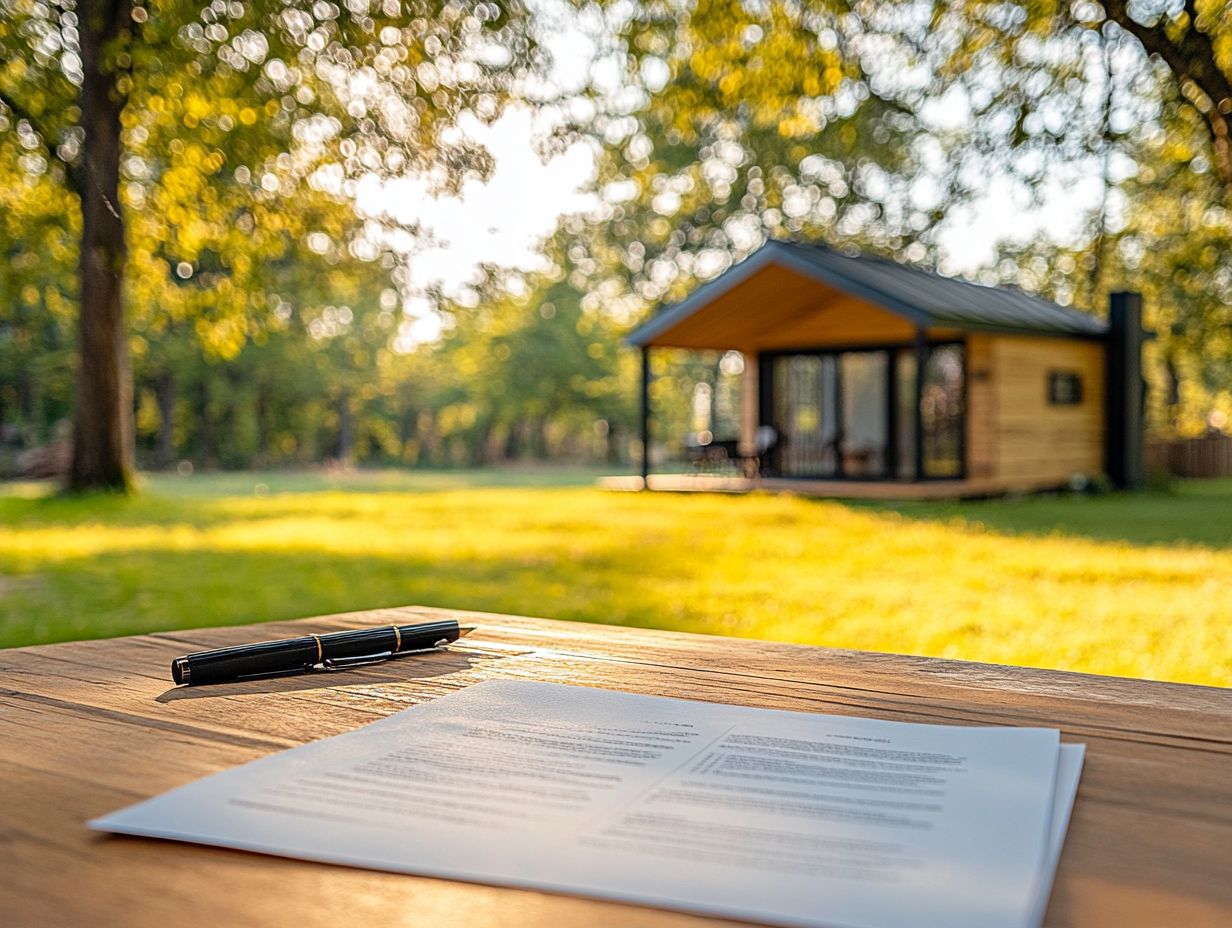
- Before pursuing tiny house living, familiarize yourself with local zoning laws, building codes, and permits to ensure your land ownership is legal and compliant.
- Consider your land ownership options: buying, leasing, or joining a tiny house community. Each option has its own legal considerations, so do your research and consult a lawyer if needed.
- Navigating legal issues with tiny house land ownership can be challenging. Work with local authorities and understand legal documents and contracts to ease the process.
Understanding Tiny House Land Ownership
Understanding Tiny House Land Ownership is essential for anyone captivated by the Tiny House Movement. It involves navigating many aspects, including tiny house laws, zoning regulations, and the foundational requirements for tiny home ownership.
This journey can be intricate, especially given the varied state regulations and local zoning laws that dictate what you can do with your tiny house whether it’s on wheels or firmly planted on a foundation.
It’s also important to understand how to integrate utilities and effectively engage with local authorities to enjoy a legally compliant and successful tiny house lifestyle.
Defining Tiny House and Land Ownership
Defining tiny house and land ownership requires a keen understanding of the unique characteristics that distinguish tiny houses, whether they’re on wheels or built on foundations, along with the legal frameworks that govern their ownership.
This insight highlights the appeal of minimalistic living and distinguishes these compact dwellings from traditional homes, which generally occupy much more space. Tiny houses often prioritize efficiency and sustainability, presenting innovative layouts that maximize usability.
As you contemplate the shift to tiny living, you’ll encounter important questions regarding land ownership, especially since zoning laws and building codes can vary dramatically by location.
In certain areas, even legally recognized tiny houses may face restrictions on placement, making it essential for you to navigate these regulations carefully to ensure compliance and avoid potential legal challenges.
Legal Considerations for Owning Land for a Tiny House
When considering the legal aspects of owning land for a tiny house, it’s crucial to explore the many tiny house laws, state regulations, and local zoning guidelines that dictate where and how you can position your tiny home whether it’s on wheels or a foundation.
Ensuring compliance with building codes is essential for the safety and legality of your tiny house; overlooking these regulations could result in penalties or even prevent you from occupying your space.
Furthermore, understanding the dynamics of the evolving tiny house market offers valuable insights into community trends and legal frameworks that could impact your decision-making.
Start your tiny house journey today explore your land ownership options now!
Local Zoning Laws and Regulations
Local zoning laws are vital for tiny house ownership. They dictate where you can legally place your tiny home, whether it’s on wheels or a foundation.
Navigating these laws can be tricky. Many municipalities haven’t adapted to the unique needs of tiny house living.
In some areas, zoning codes may classify tiny homes as trailers, limiting where you can park them. Therefore, it’s crucial to communicate with local zoning departments early in your planning.
Doing so helps you understand requirements and discover opportunities for variances or special permits. Remember, regulations differ greatly from state to state.
Building Codes and Permits
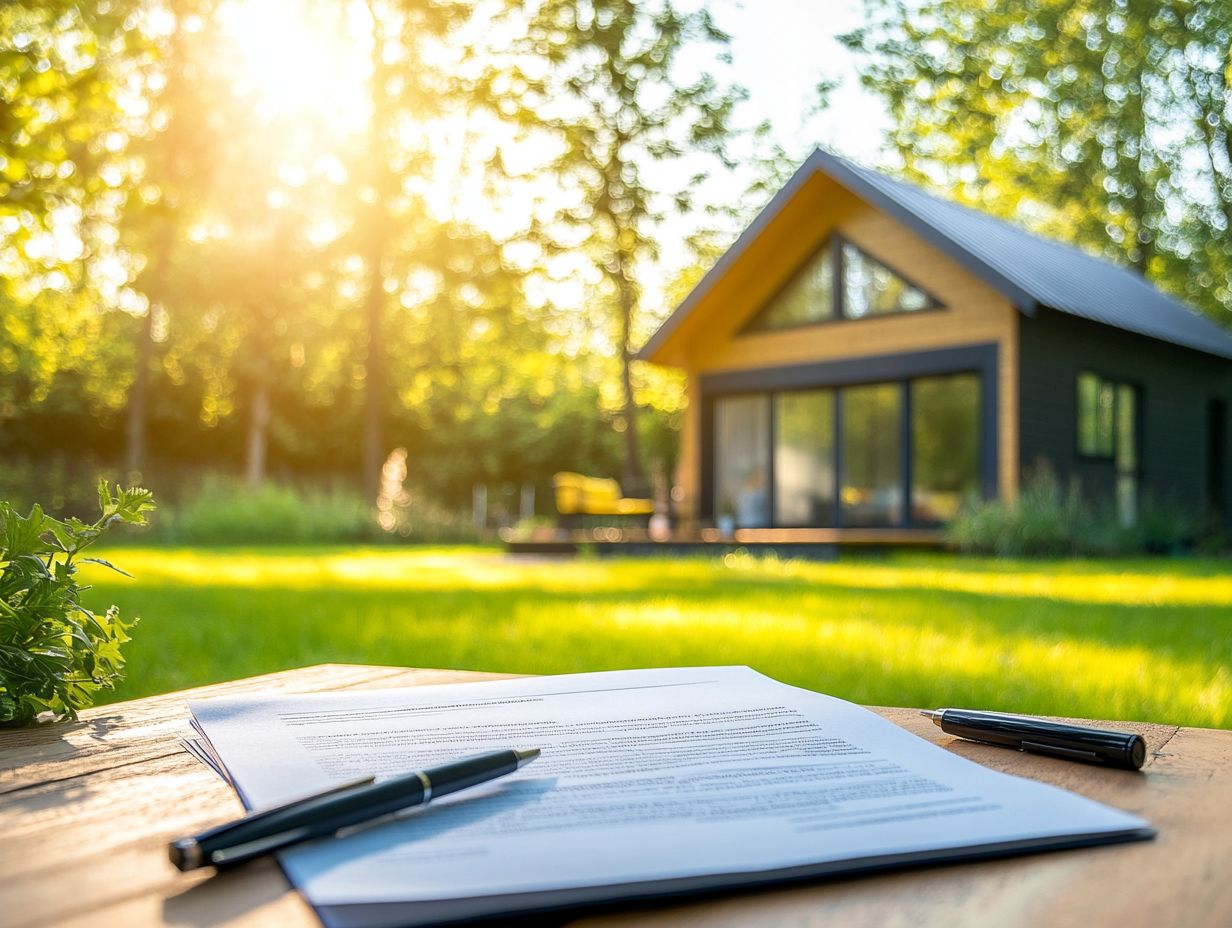
Building codes and permits are rules that ensure homes are safe and comply with local laws. They cover essential aspects like minimum ceiling height and structural integrity.
For anyone wanting to build a tiny house, understanding these regulations is crucial. Each municipality has its own requirements that cover everything from electrical systems to plumbing designs.
While the permit process may seem overwhelming, breaking it down into simple steps can ease the burden. Engage with local building officials early, familiarize yourself with regulations, and gather all necessary documents.
By taking these proactive steps, you can navigate tiny house standards and ensure your project meets legal expectations while fostering a safe living environment.
Utilities and Services
Understanding utilities and services is crucial for your tiny house experience. You’ll need to think about accessing essential services like water, electricity, and sewage management, especially if you want to integrate into a tiny house community.
By evaluating these needs, you can design your setup to align with both your preferences and community standards. If you’re part of a shared community, communal services can significantly reduce costs and encourage collaboration among residents.
If you prefer to live independently, consider options like solar energy or rainwater collection systems. These sustainable alternatives can meet local regulations.
Effectively adapting these utilities ensures that you stay comfortable in your tiny home while fulfilling legal requirements. This paves the way for a fulfilling and responsible lifestyle.
Options for Owning Land for a Tiny House
When thinking about owning land for your tiny house, you have several options. You can buy, lease, or join a tiny house community.
Each path offers distinct advantages and challenges tailored to meet your needs and preferences.
Buying Land
Buying land for your tiny house is an exciting step toward achieving your dream! This lets you pick a spot that fits your lifestyle perfectly while taking into account state regulations and connecting with tiny house builders who can help bring your vision to life.
Your journey begins with a thorough understanding of legal rules that dictate where and how tiny homes can be situated. Each municipality has its own set of rules. It’s essential to dive deep into regulations regarding minimum square footage and land rules. Familiarizing yourself with tiny house laws is crucial for every owner.
As a potential land buyer, consult state regulations that could impact your tiny house construction, such as utility connections (the links to water, electricity, and sewer services) and environmental impact assessments. For additional support, consider seeking tiny house legal assistance. Engaging with seasoned tiny house builders can provide valuable insights into site-specific challenges you might face, making your transition from concept to reality much smoother.
By grasping these critical elements, you’ll be well on your way to crafting a successful tiny home experience. Start exploring your options today and make your tiny house dream a reality!
Leasing Land
Leasing land offers a flexible solution for tiny house enthusiasts like you, letting you settle in a location that embraces tiny house living, whether that’s a tiny house on wheels or a designated spot in a tiny house community.
This arrangement can be particularly enticing if you’re hesitant about committing to a long-term property purchase. It provides you with a valuable trial period to see if the tiny house lifestyle truly resonates with you.
While you enjoy the lower upfront costs and the freedom to relocate without the burdens of land ownership, be sure to consider potential challenges. Lease agreements might impose specific restrictions on land use and limit construction options.
Local legal rules also play a pivotal role, as some areas may not permit tiny houses at all, adding complexity to the leasing experience. Understanding the importance of zoning is crucial. Weigh these factors carefully to make informed decisions that align with your tiny house aspirations.
Joining a Tiny House Community
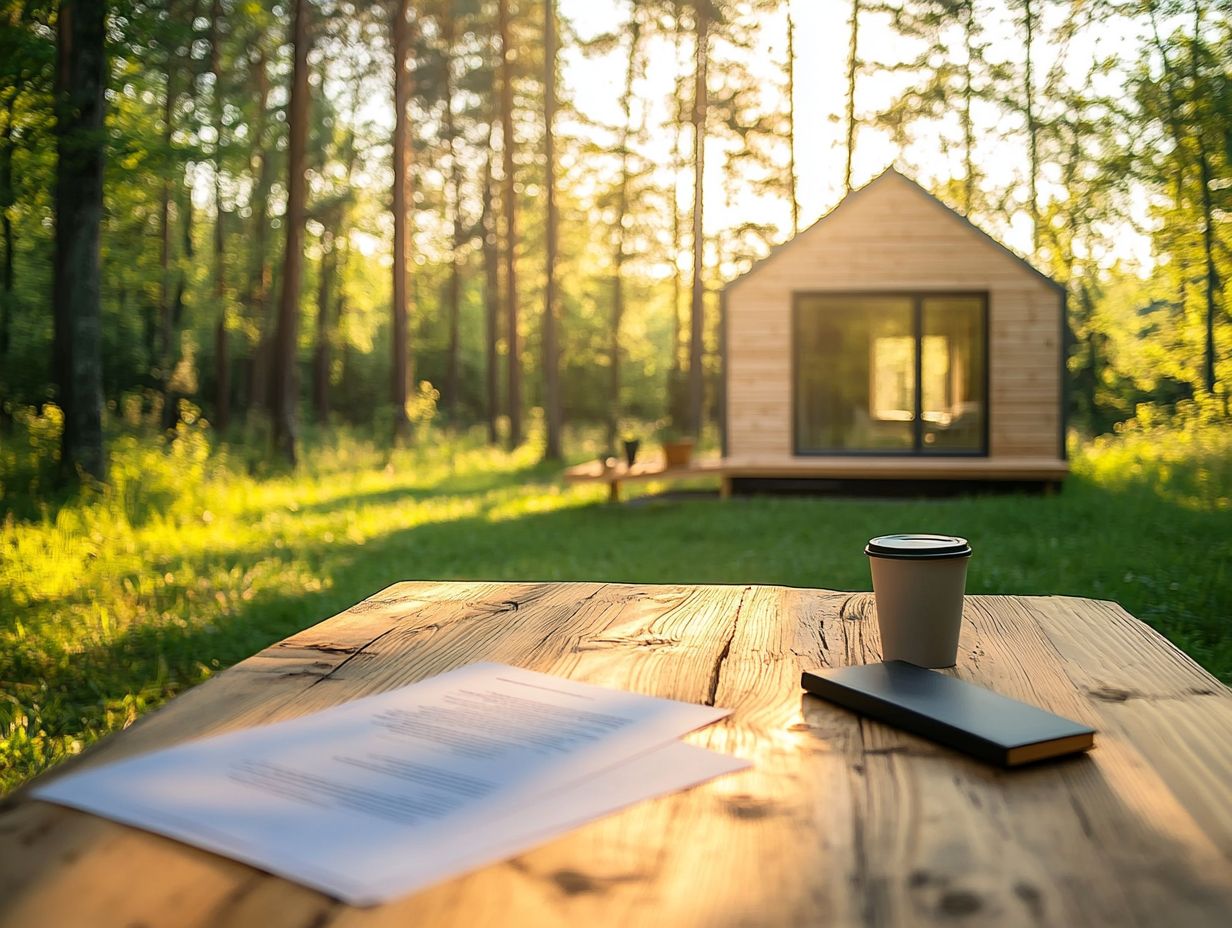
Joining a tiny house community presents you with a remarkable opportunity to connect with fellow tiny house enthusiasts. You can share resources and collectively navigate the challenges that come with tiny house living.
These communities create a warm and welcoming atmosphere where you can truly belong. They also provide vital support in understanding the local laws and regulations that pertain to tiny living.
By establishing clear community guidelines, you can help create a harmonious atmosphere where everyone has the chance to thrive. Pooling resources whether it s tools for maintenance or shared communal spaces significantly reduces individual expenses and enhances the practicality of your lifestyle.
The social aspect of these communities encourages collaboration. You and your neighbors might host workshops or share experiences, which can lead to lasting friendships and a richer living experience. Ultimately, being part of such a community nurtures an environment that promotes personal growth and innovative living solutions.
Tips for Navigating Legal Issues with Tiny House Land Ownership
Navigating the complexities of tiny house land ownership can be quite a journey. However, by collaborating with local authorities and familiarizing yourself with the essential legal documents, you can confidently ensure that your tiny house whether on wheels or a solid foundation complies with all necessary standards.
This proactive approach will help you avoid potential pitfalls and enjoy the unique lifestyle that a tiny house offers.
Working with Local Authorities
Collaborating with local authorities is fundamental for tiny house owners. By understanding tiny house laws and engaging with the local zoning department, you can streamline the permitting process and ease your transition into tiny house living.
Gather all necessary documentation before meetings think site plans, design concepts, and any relevant code compliance materials. Showcasing a clear grasp of local regulations will bolster your case.
Take Portland as an example; successful partnerships have flourished when tiny house advocates presented well-researched proposals that underscored economic benefits and sustainability. Sharpening your negotiation skills will prove invaluable in securing essential approvals!
Building rapport with officials can transform potential obstacles into opportunities, paving the way for mutually beneficial solutions for tiny house enthusiasts and local governments alike.
Understanding Legal Documents and Contracts
Understanding legal documents and contracts is essential for your journey into tiny house ownership. Clear and precise agreements lay the groundwork for a rewarding living experience, spanning everything from lease agreements to purchase contracts.
Familiarize yourself with zoning permits, which are permissions from local authorities about where you can place your tiny house. This knowledge is crucial for avoiding fines or the hassle of forced relocations. Additionally, consider exploring tiny house legal resources you should know to ensure you stay informed on regulations.
Reviewing maintenance agreements is another smart move; it ensures that any shared facilities are well-maintained, ultimately protecting the value of your investment. Grasping these various legal documents gives you the power to navigate the complexities of your new lifestyle with confidence.
With clarity in every agreement, you can focus on relishing your unique living space instead of worrying about potential legal issues that might be hanging over your head. Don t wait until it s too late!
Frequently Asked Questions
What is considered legal when it comes to owning land for a tiny house?
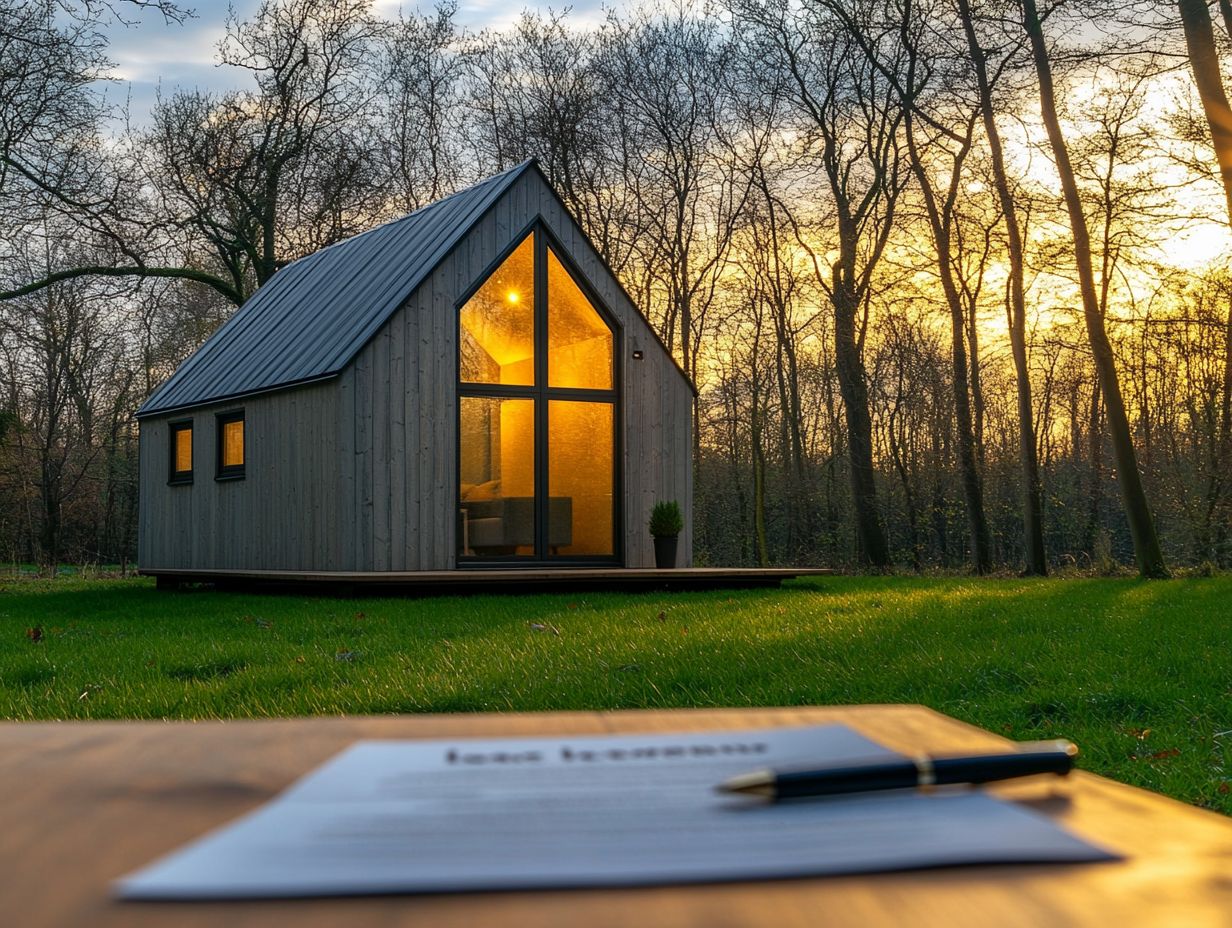
Legal ownership of land for a tiny house depends on various factors such as zoning laws, building codes, and local regulations. Do thorough research and consult with legal professionals before making any purchase or building decisions.
Can I legally place a tiny house on a piece of land I already own?
You can place a tiny house on your land, but check for any restrictions first. Deed restrictions, homeowners associations, and existing land use agreements may limit the use of your land for a tiny house.
What zoning laws should I be aware of when looking for land for a tiny house?
Zoning laws vary by location, regulating the type of structures and land use allowed in a specific area. Research and understand the zoning laws in your desired location to ensure that your tiny house is allowed on the land.
Are there any building codes to follow when constructing a tiny house on land I own?
Yes, building codes regulate the construction and safety standards for all structures, including tiny houses. Consult with local building officials to ensure that your tiny house is up to code and safe for occupancy.
Do I have to pay property taxes if I own land for a tiny house?
Yes, owning land for a tiny house means you will be responsible for property taxes. The amount you pay will depend on the value of the land and any structures on it. It is important to budget for property taxes when considering land ownership for a tiny house.
Can I legally rent out my tiny house on land that I own?
The legality of renting out a tiny house on your land depends on local regulations and zoning laws. Some areas may prohibit short-term rentals, while others may require a permit or license. Research and comply with all regulations before renting out your tiny house on land you own.
Start your tiny house journey today by understanding your local laws!


